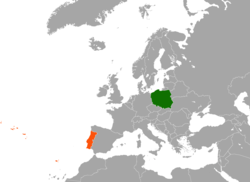Poland–Portugal relations
 | |
Poland |
Portugal |
|---|---|
Poland–Portugal relations are the bilateral relations between the Republic of Poland and the Portuguese Republic. Both nations are members of the Council of Europe, European Union, NATO and the United Nations.
History[]
On 21 June 1919, the Portuguese government recognized the independence of Poland.[1] In May 1922, diplomatic relations were formally established between both nations.[2] In July 1923, Portugal opened a resident embassy in Warsaw.[1]

In 1945, soon after World War II, Portugal broke diplomatic relations with the newly independent Poland as Portugal did not withdraw its recognition of the Polish government-in-exile in London.[2] As a result, relations between both nations remained cold. The Polish People's Republic criticized the regime of António de Oliveira Salazar in Portugal and did not admit the possibility of establishing diplomatic relations with Lisbon. The Portuguese authorities showed the same attitude towards Poland, while Portuguese politicians were equally critical of the communist regime in Warsaw. However, the Carnation Revolution and political transformations in Portugal made it possible for the establishment of diplomatic relations.[2]
On 11 July 1974, both nations re-established diplomatic relations. In December 1974, Poland established a resident embassy in Lisbon. In January 1975, Portugal opened a resident embassy in Warsaw.[2]
Both nations work closely together as mutual members of the European Union. There have also been several high-level visits between leaders of both nations. Polish President Lech Kaczyński visited Portugal in 2007, and Portuguese President Aníbal Cavaco Silva paid a visit to Poland in 2008.
Bilateral agreements[]
Both nations have signed several bilateral agreements such as an Agreement on the development of trade, navigation and economic, industrial and technical cooperation (1975); Agreement on cultural and scientific cooperation (1975); Agreement on air transportation (1975); Agreement for scientific and technological cooperation (2005); and an Agreement for the mutual recognition of academic diplomas issued by both nations universities (2015).[1][2]
Resident diplomatic missions[]

Embassy of Poland in Lisbon
Embassy of Portugal in Warsaw
References[]
- Poland–Portugal relations
- Bilateral relations of Poland
- Bilateral relations of Portugal



